
POLYMER SCIENCE SERIES A
Scope & Guideline
Advancing Polymer Knowledge, One Article at a Time
Introduction
Aims and Scopes
- Polymer Synthesis and Characterization:
Research on the synthesis of novel polymers, including copolymers and polymer blends, along with their characterization techniques to determine their structural and functional properties. - Polymer Processing and Applications:
Exploration of the processing methods for polymers, including molding, extrusion, and 3D printing, as well as the study of their applications in various sectors such as packaging, biomedical devices, and electronics. - Polymer Composites and Nanocomposites:
Investigation into the development and performance of polymer composites reinforced with various fillers (e.g., carbon nanotubes, graphene, and natural fibers) to enhance mechanical, thermal, and electrical properties. - Smart and Functional Polymers:
Research focused on the design and application of smart polymers that respond to external stimuli (e.g., temperature, pH, and electric fields) for applications in sensors and actuators. - Biodegradable and Eco-friendly Polymers:
Studies emphasizing the synthesis and characterization of biodegradable polymers and biocomposites for sustainable applications, particularly in packaging and medical fields. - Polymer Physics and Rheology:
Investigation into the physical properties of polymers, including rheological behavior, phase transitions, and kinetic studies, to understand their performance in various applications.
Trending and Emerging
- Biopolymer Development and Applications:
There is a growing trend towards the research and application of biopolymers, highlighting their role in sustainability and environmental conservation, particularly in packaging and biomedical fields. - Nanotechnology in Polymers:
The integration of nanotechnology into polymer science is on the rise, with an increasing number of studies focusing on nanocomposites and their enhanced properties for various applications. - Smart and Responsive Polymers:
Research on smart polymers that respond to environmental stimuli (e.g., temperature, light, and pH) is gaining traction, indicating a shift towards developing materials for advanced applications in sensors and drug delivery. - Sustainable Polymer Materials:
The emphasis on sustainability is evident, with a focus on developing eco-friendly polymers and composites that utilize renewable resources and are biodegradable. - Advanced Polymer Processing Techniques:
Emerging processing methods, including 3D printing and electrospinning, are being increasingly explored, indicating a shift towards more flexible and innovative manufacturing techniques for polymer-based products.
Declining or Waning
- Traditional Thermosetting Polymers:
Research on classic thermosetting polymers appears to be declining, likely due to increased interest in more versatile and sustainable materials such as thermoplastics and bio-based polymers. - Conventional Additive Manufacturing Techniques:
The focus on traditional additive manufacturing methods for polymers has waned, with more recent publications emphasizing advanced techniques such as 3D printing with multi-materials and bio-inks. - Single-Use Plastics:
Research centered on single-use plastics has decreased, possibly in response to growing environmental concerns and regulations prompting a shift toward sustainable alternatives. - Basic Polymer Chemistry:
Studies on fundamental polymer chemistry without direct applications are becoming less frequent, as researchers increasingly seek to connect fundamental science with practical applications. - Low-Temperature Polymer Applications:
Interest in low-temperature applications of polymers, such as in cryogenic environments, is declining, possibly due to a focus on more relevant applications in everyday life and industry.
Similar Journals

MACROMOLECULAR RESEARCH
Exploring Innovations in Macromolecular EngineeringMACROMOLECULAR RESEARCH, published by the POLYMER SOC KOREA, is a premier journal dedicated to advancing the field of macromolecular science and polymer engineering. With its ISSN 1598-5032 and E-ISSN 2092-7673, this journal has emerged as a vital platform for researchers and professionals interested in the application and development of polymers across various domains. Based in South Korea and operating as an open-access resource since its inception in 2002, MACROMOLECULAR RESEARCH consistently ranks in the Q2 category across diverse fields such as Chemical Engineering, Materials Chemistry, and Organic Chemistry as per the latest 2023 metrics. Notably, it is recognized for its substantial contributions to polymery science, increasing its visibility and impact in global research. By providing a forum for original research articles, reviews, and innovative methodologies, this journal aims to foster collaboration and knowledge sharing among scientists, engineers, and students alike. Join a community that is at the forefront of polymer research by exploring the wealth of resources and cutting-edge studies featured in MACROMOLECULAR RESEARCH.
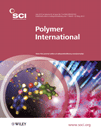
POLYMER INTERNATIONAL
Shaping the Landscape of Materials SciencePOLYMER INTERNATIONAL is a leading journal in the field of polymer science, published by Wiley, one of the most esteemed scholarly publishers. With an ISSN of 0959-8103 and an E-ISSN of 1097-0126, this journal has been a pivotal platform for researchers since its inception in 1991, now extending its coverage until 2024. The journal boasts a commendable standing in various scientific domains, achieving a Q2 quartile ranking in Materials Chemistry, Organic Chemistry, and Polymers and Plastics as of 2023. Additionally, it holds impressive Scopus ranks, including Rank #47 in Organic Chemistry and Rank #40 in Polymers and Plastics, placing it within the top percentiles of its categories. Researchers, professionals, and students alike can benefit from its rich array of articles that contribute to the understanding and advancement of polymer technology and materials science. Although not an open access journal, POLYMER INTERNATIONAL remains crucial for disseminating high-quality research that drives innovation and development within the field.
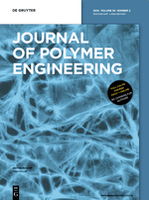
JOURNAL OF POLYMER ENGINEERING
Advancing the Frontiers of Polymer Science.JOURNAL OF POLYMER ENGINEERING, published by Walter de Gruyter GmbH, stands as a pivotal platform in the field of polymer science and engineering. With an ISSN of 0334-6447 and an E-ISSN of 2191-0340, this journal has been a vital contributor to the academic landscape since its inception, spanning publications from 1981 to 2024. As a recognized entity in the realms of Chemical Engineering, Materials Chemistry, and Polymers and Plastics, it holds a respectable position in Q3 quartile rankings according to the latest assessments. The journal is positioned to promote the exchange of cutting-edge research findings, technological advancements, and critical reviews that address the complexities of polymer application and innovation. Researchers and professionals will find a wealth of information, from experimental methodologies to theoretical analyses, all designed to inspire and elevate the current understanding of polymer engineering. By fostering collaboration and dissemination of knowledge, the JOURNAL OF POLYMER ENGINEERING remains crucial for advancing research and education in its specialized domains.
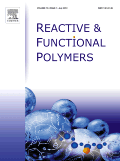
REACTIVE & FUNCTIONAL POLYMERS
Pioneering Research for a Sustainable Polymer FutureREACTIVE & FUNCTIONAL POLYMERS, published by Elsevier, is a leading journal in the field of polymer science, focusing on the innovative development and application of reactive and functional polymers. With an impressive impact demonstrated through its classification in various prestigious categories, including Q1 rankings in Chemical Engineering, Chemistry, and Materials Chemistry, this journal serves as an essential resource for researchers and professionals seeking to explore the latest advances in polymer research. With a broad scope that encompasses topics from biochemistry to environmental chemistry, and a convergence of significant findings from 1995 to 2024, REACTIVE & FUNCTIONAL POLYMERS fosters academic dialogue and collaboration among scientists. The journal also features Open Access options, ensuring that groundbreaking research is readily available to a global audience. By consistently publishing high-quality articles, it not only enriches the scientific community but also drives innovation across various industries reliant on polymer technologies.
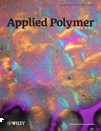
JOURNAL OF APPLIED POLYMER SCIENCE
Advancing the Frontiers of Polymer ResearchThe Journal of Applied Polymer Science, published by Wiley, is a leading journal in the field of polymer science, showcasing innovative research and applications in various domains since its inception in 1959. With an ISSN of 0021-8995 and an E-ISSN of 1097-4628, it is indexed in prominent databases, maintaining a strong presence with Scopus rankings placing it in the Q2 category across multiple disciplines, including Chemistry, Materials Chemistry, and Polymers and Plastics. The journal’s commitment to advancing scientific knowledge is reflected in its impact on the materials science community, with noteworthy rankings such as #38 in Surfaces, Coatings and Films and #51 in Polymers and Plastics. Though not an open-access publication, it remains a vital resource for researchers, professionals, and students aiming to deepen their understanding of polymer applications and to stay abreast of the latest developments in this ever-evolving field. With a focus on high-quality research, the Journal of Applied Polymer Science continues to be a cornerstone for those engaged in polymer research and its myriad applications.
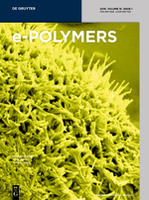
E-POLYMERS
Exploring the Frontiers of Polymer Science and EngineeringE-Polymers, an esteemed journal published by De Gruyter Poland Sp. z o.o., serves as a vital platform for advancing knowledge in the fields of chemical engineering, polymer science, and theoretical chemistry. With its Open Access policy since 2019, researchers from around the globe can freely access and disseminate groundbreaking findings that span the convergence of diverse disciplines, making it an indispensable resource for both academia and industry. The journal is recognized for its significant impact, reflected in its Q2 ranking in Chemical Engineering, Physical and Theoretical Chemistry, and Polymers and Plastics categories in 2023. Its impressive Scopus rankings further solidify its position, showcasing a percentile rank of 70th and above across major categories. With a publication history extending from 2001 to 2024, E-Polymers continually addresses pressing challenges within the polymer research community, fostering innovation and collaboration among researchers, professionals, and students eager to contribute to the evolving landscape of materials science.

INTERNATIONAL JOURNAL OF POLYMER ANALYSIS AND CHARACTERIZATION
Advancing the frontiers of polymer science.International Journal of Polymer Analysis and Characterization is a distinguished scholarly publication dedicated to the field of polymer science, with a focus on innovative methodologies and significant advances in the analysis and characterization of polymeric materials. Published by Taylor & Francis Ltd in the United Kingdom, this journal serves as a vital resource for researchers, professionals, and students deeply engaged in Analytical Chemistry, Chemical Engineering, and Polymer Science. With a convergence spanning from 1995 to 2024, it holds a Q3 ranking in the 2023 category quartiles for its valuable contributions to the fields of Analytical Chemistry, Chemical Engineering, and Polymers and Plastics. Despite being a non-open access publication, its rigorous peer-review process and comprehensive coverage of current trends ensure that the journal remains a crucial platform for disseminating impactful research. The journal is indexed in various databases, underscoring its relevance and quality in the academic community. Exploratory studies and articles that push the boundaries of polymer analysis find a welcoming home within these pages, making it an essential read for those aiming to stay at the forefront of polymer research.
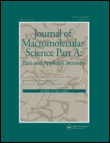
Journal of Macromolecular Science Part A-Pure and Applied Chemistry
Fostering Global Collaboration in Macromolecular ResearchWelcome to the Journal of Macromolecular Science Part A - Pure and Applied Chemistry, a distinguished publication dedicated to advancing the understanding of macromolecular science, encompassing critical areas such as polymers, materials chemistry, and composites. Published by Taylor & Francis Inc, this journal has firmly established its place within the scientific community, evident from its ranking in the Q2 and Q3 quartiles across various categories in the latest assessments, including Polymers and Plastics as well as Ceramics and Composites. With a commitment to providing high-quality peer-reviewed content, the journal aims to facilitate knowledge exchange and innovation among researchers and practitioners from around the globe. The absence of open access underscores the journal's commitment to maintaining rigorous editorial standards while remaining accessible to its readership. As the journal converges through valuable research contributions from 1992 to 2024, it continues to be a pivotal resource for professionals and students seeking to explore the latest advancements and applications in the field of macromolecular science.

INTERNATIONAL POLYMER PROCESSING
Connecting Professionals through Polymer Research InsightsINTERNATIONAL POLYMER PROCESSING, published by WALTER DE GRUYTER GMBH, serves as a crucial platform for professionals and researchers in the fields of Chemical Engineering, Industrial and Manufacturing Engineering, and Materials Science, particularly focusing on polymers and plastics. With its ISSN 0930-777X and E-ISSN 2195-8602, this journal has been in circulation since 1988 and continues to expand its contributions to contemporary research trends through to 2024. Ranking in the third quartile across multiple categories, including Chemical Engineering (miscellaneous) and Materials Chemistry, it offers insightful and rigorous peer-reviewed articles that enhance the understanding of polymer processing technologies and innovations. This journal is vital for anyone engaged in polymer science and engineering, providing both theoretical and practical perspectives that advance the field. Although it does not provide open access, the journal's content is indispensable for academia and industry professionals looking to stay at the forefront of polymer research.
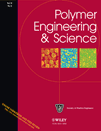
POLYMER ENGINEERING AND SCIENCE
Transforming Ideas into Polymer SolutionsPOLYMER ENGINEERING AND SCIENCE, published by WILEY, is a premier journal specializing in the field of polymer science and engineering. Since its inception in 1961, this journal has been at the forefront of disseminating high-quality research, focusing on various aspects of polymers and plastics, including their chemistry, properties, and applications. With an impressive impact factor, it ranks in the second quartile (Q2) across multiple categories, including Chemistry (Miscellaneous), Materials Chemistry, and Polymers and Plastics, showcasing the journal's significance and influence in these vital areas of research. Researchers and professionals in academia and industry will find the latest advancements and innovative methodologies in polymer science, making this journal an essential resource for those looking to stay updated on cutting-edge developments. While it does not currently support Open Access, its comprehensive scope and critical insights positioned it as a valuable platform for advancing knowledge and fostering collaboration within the polymer community. The journal’s office is located at 111 River St, Hoboken 07030-5774, NJ, United States, emphasizing its strong presence in the academic landscape.